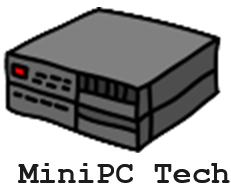Why Consider the Benefits of SSDs in Mini PCs?
You’ve likely noticed your mini PC’s performance doesn’t match your workflow demands. The culprit? That dated hard drive spinning inside. Solid-state drives represent a fundamental shift in computing architecture, not merely an incremental upgrade. They transform mini PCs from adequate to exceptional through seven distinct advantages that affect everything from startup times to overall system longevity. The technical benefits of SSDs extend far beyond what most users initially consider.
Key Takeaways
- SSDs reduce boot times to 10-22 seconds and provide near-instant application responsiveness, significantly improving workflow efficiency.
- The compact M.2 SSD form factor (22mm x 80mm) enables space optimization in mini PCs and creative internal layouts.
- With a 0.98% annual failure rate, SSDs offer superior reliability and shock resistance compared to mechanical hard drives.
- SSDs operate silently and consume less power, extending battery life and reducing the need for aggressive cooling.
- NVMe SSDs deliver read speeds over 3500 MB/s, eliminating performance bottlenecks during intensive multitasking.
Lightning-Fast Boot and Load Times
When comparing storage solutions for mini PCs, SSDs deliver dramatically faster boot times than traditional HDDs, cutting startup times nearly in half. Your system will typically boot in just 10-22 seconds with an SSD versus 30-42 seconds with an HDD, eliminating mechanical delays from spinning platters.
This speed advantage extends beyond the boot sequence. You’ll experience near-instant application responsiveness as SSDs access system files virtually immediately. Programs launch faster, games load quicker, and video editing workflows become more efficient with reduced wait times. SSDs are also more energy-efficient than HDDs, which is particularly beneficial for mini PCs where power consumption and heat generation are important factors. Even with older hardware like a 5400 RPM hard drive, optimization techniques can improve performance, though SSDs still maintain a significant advantage.
Unlike HDDs that slow down from fragmentation over time, your SSD will maintain consistent performance throughout its lifespan without requiring defragmentation.
For maximum speed in compact systems, consider NVMe SSDs, which offer theoretical transfer rates exceeding 2GB/s—though real-world boot improvements may be modest compared to standard SATA SSDs. Additionally, the faster storage enables smoother HDMI streaming from your mini PC to your TV for media consumption without buffering or stuttering. For Plex server applications, SSDs are ideal for metadata storage as they significantly improve library loading times when browsing through large media collections.
Reliable Performance Without Mechanical Failures
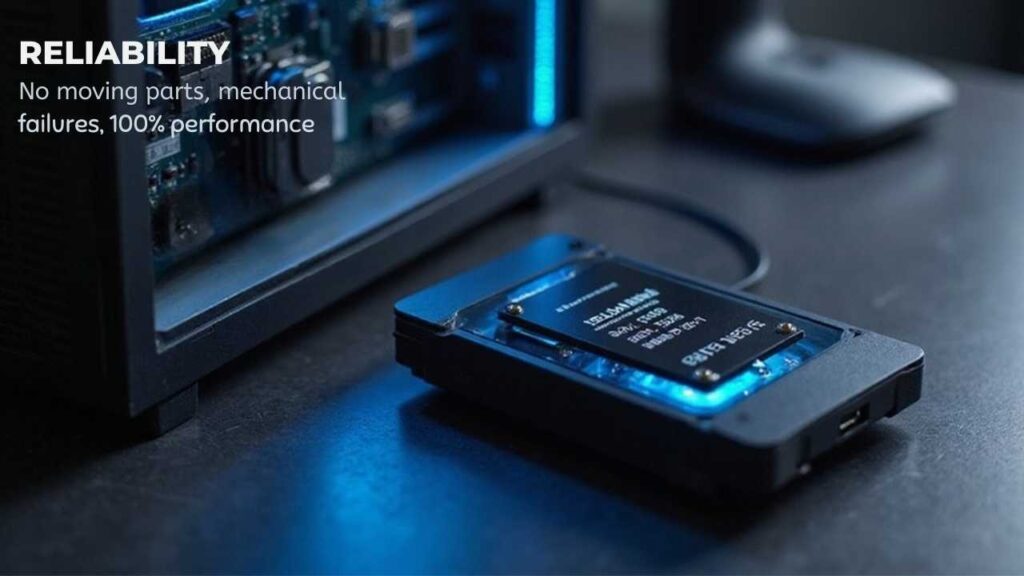
Reliability stands as one of the paramount advantages SSDs bring to mini PC systems. Without moving parts, these storage solutions deliver failure rates of just 0.98% annually—nearly half that of traditional HDDs.
You’ll experience superior data longevity as SSDs resist the magnetic degradation that plagues mechanical drives after 4-5 years of operation.
Your mini PC gains enhanced durability against drops and vibrations that would likely cause catastrophic head crashes in HDDs.
This resilience extends to environmental challenges, with impressive heat resistance allowing SSDs to maintain stable performance in thermally constrained mini PC enclosures. Despite running at higher temperatures than HDDs, averaging 34.9 degrees Celsius compared to 29.1 degrees for HDDs, SSDs still maintain lower failure rates.
The absence of mechanical components eliminates the need for defragmentation and reduces maintenance requirements, translating to higher uptime and consistent performance throughout your device’s lifespan. Modern SSDs typically offer larger lifespan than traditional HDDs, making them ideal for long-term mini PC installations.
When selecting a mini PC for remote work, an SSD provides faster boot times and improved data access speeds compared to traditional HDDs, making your compact workstation more responsive during intensive tasks.
For an optimized viewing experience, SSDs facilitate seamless streaming of high-definition content when connecting your mini PC to a television display.
Silent Operation and Energy Conservation
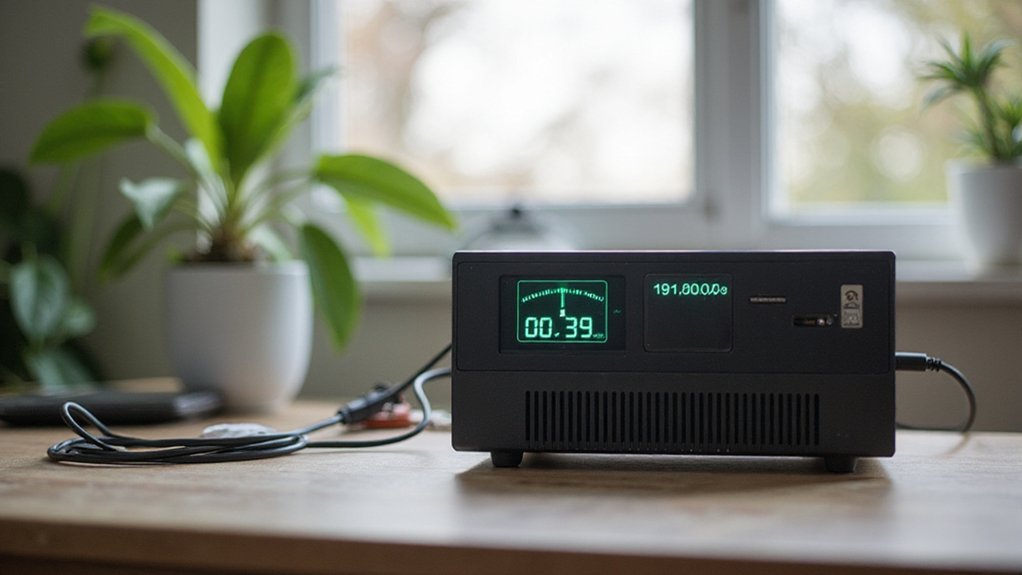
Unlike traditional HDDs with their mechanical components, SSDs deliver completely silent operation in mini PC environments, creating noise profiles equivalent to passive electronic components.
You’ll appreciate these silent benefits in noise-sensitive settings like libraries, recording studios, and medical facilities where distractions must be minimized.
The energy efficiency of SSDs is equally impressive.
With no spinning disks or actuators, they consume considerably less power, reducing heat generation and supporting fanless designs.
SSDs deliver silent, power-efficient performance, minimizing heat and enabling fanless mini PC designs for cooler, quieter computing.
This translates to extended battery life in portable units and lower electricity costs for stationary systems.
The reduced thermal output further enhances silent operation by eliminating the need for active cooling solutions.
Your mini PC maintains peak performance without thermal throttling or noisy fans, creating a sustainable computing solution with a smaller carbon footprint.
Similar to how Wi-Fi Direct enables efficient peer-to-peer streaming without internet dependency, SSDs provide direct data access without mechanical movement barriers.
The solid-state design also significantly improves overall reliability by minimizing the risk of mechanical failures common to traditional storage solutions.
SSDs dramatically outperform conventional hard drives with a failure rate of approximately 1.5 million hours, offering substantially greater longevity and dependability.
Space-Saving Design for Compact Computing
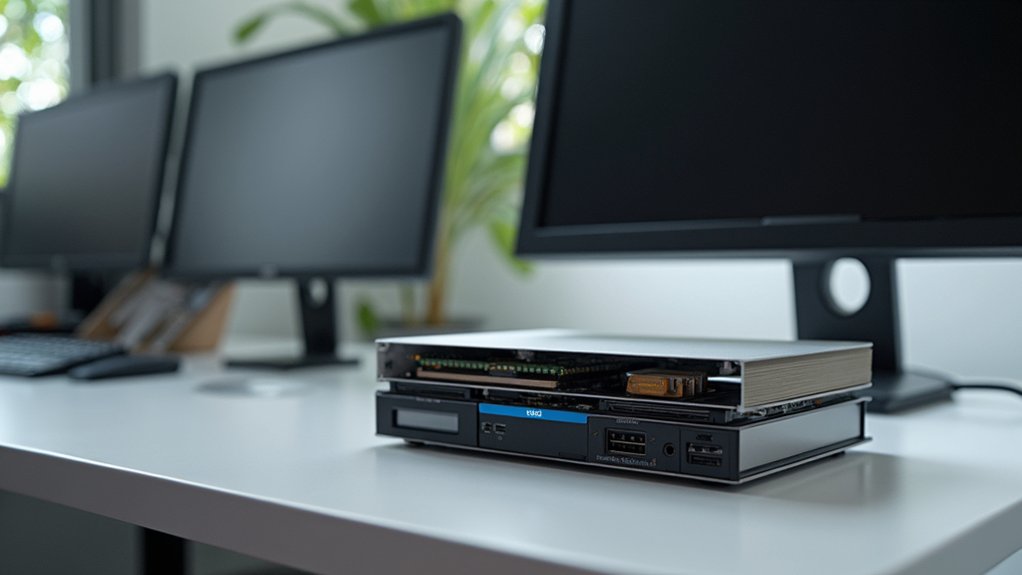
SSDs revolutionize mini PC design with their ultra-minimal footprint, allowing you to maximize functionality within severely constrained chassis dimensions.
You’ll appreciate how these compact storage solutions optimize limited internal space by replacing bulky HDDs with thin M.2 cards or 2.5-inch drives that occupy a fraction of the volume.
The variety of available SSD form factors provides you with unprecedented freedom in component placement, enabling more creative mini PC layouts while accommodating additional hardware like expansion cards or enhanced cooling systems. The M.2 form factor has become especially popular in modern mini PCs due to its stick-like design that saves significant space compared to traditional storage options. Mini PCs with SSDs provide dual-channel memory capabilities that significantly improve system performance through increased data throughput. Additionally, mini PCs equipped with SSDs require less cooling systems, contributing to even more space efficiency and environmentally friendly computing solutions. These space-saving designs align with the energy efficiency benefits that mini PCs offer over traditional desktop systems.
Ultra-Minimal Footprint Advantage
The remarkable miniaturization of modern storage technology fundamentally transforms what’s possible in compact computing. M.2 SSDs weighing as little as 7 grams and measuring just a few centimeters empower minimal design approaches previously unattainable with traditional HDDs.
You’ll benefit from the elimination of bulky storage bays, allowing your mini PC to maintain a dramatically reduced physical footprint without sacrificing capacity. The absence of power and data cables with NVMe drives removes internal clutter, enabling optimized motherboard layouts and denser component packing.
This compact storage architecture supports ultra-slim profiles ideal for limited desk spaces or portable applications. Modern mini PCs like the Beelink Mini S12 Pro leverage this advantage with 500GB SSD capacity that’s upgradeable to 2TB. The variety of diverse form factors makes SSDs extremely versatile for integration into mini PC designs. The smallest SSD form factors can be comparable to a stick of gum, accommodating diverse applications and environments. This space optimization perfectly aligns with the cost efficiency benefits that mini PCs bring to modern businesses. The physics of SSD design permits this radical miniaturization while delivering superior performance—a critical advantage when every millimeter counts in creating truly compact computing solutions.
Optimizing Limited Space
Three critical dimensions define SSD optimization in mini PC environments: spatial, thermal, and computational density.
When you integrate SSDs into your compact system, you’re leveraging their slim profile to maximize internal configuration possibilities while enhancing thermal management through considerably reduced heat output compared to mechanical drives. No moving parts in SSDs contribute significantly to their durability and resistance to physical stresses in compact environments.
- SSDs facilitate innovative cable organization by eliminating bulky SATA connections, creating cleaner airflow paths inside your constrained chassis.
- Their low power consumption reduces thermal load, enabling smaller cooling solutions and preserving precious internal space.
- The physical compactness supports mounting in unconventional locations, such as behind motherboards or beneath heat sinks.
This space efficiency isn’t merely about fitting components—it’s about enabling higher performance density in an increasingly miniaturized computing landscape where every cubic millimeter must contribute maximum functionality. The dramatically faster load times with SSDs allow mini PCs to boot up in under a minute compared to the several minutes required by HDDs.
Form Factor Freedom
While traditional storage solutions demand substantial physical space, M.2 SSDs revolutionize mini PC architecture by occupying just 22mm × 80mm of motherboard real estate. This compact profile eliminates cables and drive bays, enabling manufacturers to design sleeker, lighter systems without sacrificing storage capacity.
The form factor versatility of M.2 drives supports various installation orientations, optimizing motherboard layouts and freeing space for enhanced connectivity options. This flexibility facilitates innovative chassis designs unconstrained by standard drive dimensions, while maintaining broad motherboard compatibility across modern mini PC platforms. Mini PCs particularly benefit from the specially designed M.2 2230 size that fits perfectly in their constrained internal spaces. As demonstrated in the GEEKOM A8, this compact design allows for high-speed NVMe SSDs while still maintaining its impressive 4.41″ x 4.41″ x 1.46″ dimensions.
You’ll benefit from strategic component placement that improves airflow, reduces thermal throttling risks, and supports multiple SSDs in the same footprint. The streamlined integration bypasses traditional drive infrastructure, enabling modular designs where upgrades require minimal disassembly. These compact SSDs utilize NVMe interface for dramatically faster data access than traditional SATA connections. Systems like the MINISFORUM Venus UM790 Pro leverage dual M.2 slots to maximize both storage capacity and performance while maintaining its compact 6.5 × 6.5 × 2.5 inch footprint.
Blazing Data Transfer for Modern Workloads
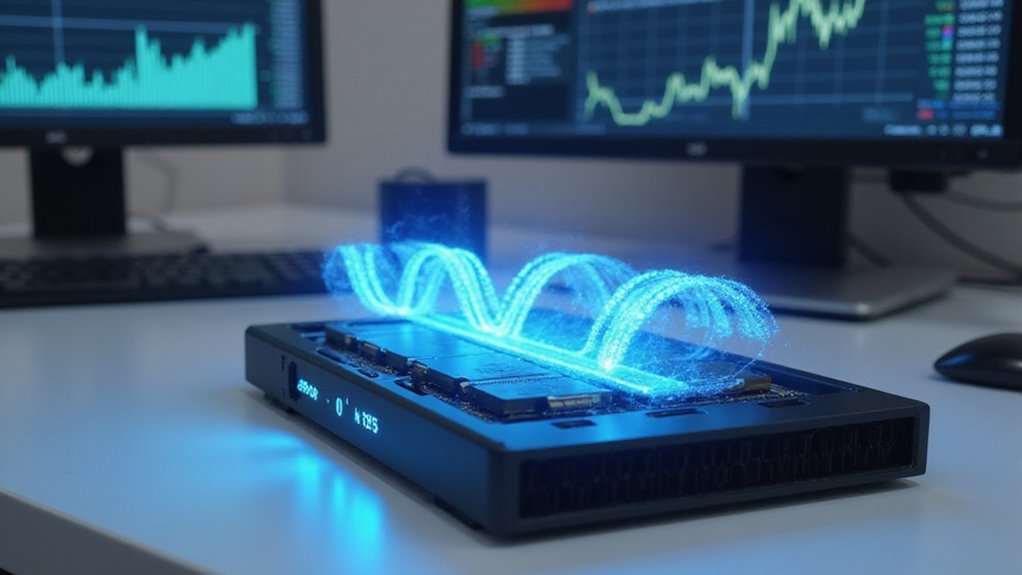
NVMe SSDs in mini PCs deliver exceptional read speeds exceeding 3500 MB/s through PCIe x4 lanes, dramatically outperforming traditional SATA SSDs that top out around 550 MB/s.
You’ll experience tangible performance improvements in video editing workflows as large files transfer nearly instantly between drives at rates above 1000 MB/s.
Your multitasking capabilities expand greatly with these ultra-fast storage solutions, eliminating bottlenecks during sustained high bandwidth operations like continuous data capture at 230 MB/s. The compact size of mini PCs makes these SSD performance gains even more impressive, providing desktop-class storage speeds in a dramatically smaller footprint. For astronomical imaging applications, these SSDs provide critical buffer memory capacity that prevents performance degradation when capturing full-frame 20MP images.
Ultra-Fast File Operations
When modern computing demands lightning-fast performance, SSDs provide the essential backbone for ultra-fast file operations in mini PCs.
You’ll experience dramatic file transfer improvements with SSD speeds ranging from 500 MB/s to 7,000 MB/s for NVMe models—up to 28 times faster than traditional HDDs.
This transformative technology delivers:
- Near-instantaneous boot times around 10 seconds versus HDD’s minute-plus startup
- Accelerated read/write performance of 5,000+ MB/s for NVMe drives, eliminating workflow bottlenecks
- Efficient data management during frequent write cycles through intelligent wear leveling algorithms
Your mini PC’s responsiveness fundamentally changes with SSD integration, eliminating mechanical latency while maintaining peak performance during intensive multitasking. Unlike HDDs with their moving parts, SSDs offer superior data integrity under stress when your mini PC is transported or bumped.
These solid-state alternatives also contribute to overall energy efficiency by consuming significantly less power than traditional drives, aligning with mini PCs’ eco-friendly design principles.
For innovation-focused professionals, this translates to seamless creative workflows and uncompromising productivity in the smallest form factors. PCIe Gen 4 interfaces allow for 2 GB/s per lane throughput, further enhancing mini PCs’ capability to handle demanding applications.
Many mini PC enthusiasts integrate SPI communication protocols to expand functionality by connecting full-duplex capable sensors and displays to their SSD-equipped systems.
Video Editing Performance Boost
Video editing professionals rely on lightning-fast storage solutions as the foundation for their demanding workflows, which is precisely where SSD-equipped mini PCs excel.
You’ll experience dramatically smoother scrubbing through 4K footage and reduced lag when manipulating high-bitrate content, transforming your editing process.
SSDs deliver significant performance optimization benefits, including faster launch times for resource-intensive applications like DaVinci Resolve and Adobe Premiere Pro.
Your rendering and export operations will accelerate substantially, enabling quicker iteration cycles and meeting tight deadlines.
Multi-track projects that would cripple HDD-based systems run effortlessly on SSD-equipped mini PCs.
The consistent high IOPS capabilities guarantee your video editing sessions remain stable during simultaneous encoding, rendering, and timeline manipulation—critical advantages for professionals who can’t afford workflow disruptions.
Mini PCs like the Minisforum UM790 Pro with its AMD Ryzen 9 processor particularly benefit from SSD storage when handling demanding 4K video editing tasks.
The ultra-fast PCIe 4.0 SSD support in GEEKOM Mini PCs ensures enhanced data transfer speeds crucial for handling large video files efficiently.
Advanced mini PCs featuring expandable RAM options up to 96GB further complement SSD performance for complex video editing projects.
Modern mini PCs with thermal management systems prevent overheating during intensive video rendering sessions, maintaining optimal SSD performance throughout your projects.
NVME Vs SATA Speeds
While professional video editing demands lightning-fast storage, the underlying SSD technology drives those performance gains in mini PCs.
NVMe advantages become immediately apparent when examining interface architecture: PCIe connections enable direct CPU access, bypassing SATA limitations that bottleneck data transfer rates at 600 MB/s.
The quantitative performance gap is substantial:
- NVMe drives deliver up to 3500+ MB/s speeds with bandwidth reaching 32 Gbps
- SATA interfaces cap at 6 Gbps with minimal scalability across generations
- Command queue architecture (64,000 vs. 32) enables NVMe’s superior multitasking capabilities
The processor-intensive workloads in modern mini PCs benefit from NVMe’s parallelism and reduced latency.
While SATA remains adequate for basic tasks, your demanding applications will experience transformative performance improvements with NVMe’s architectural advantages.
For virtualization workloads, NVMe storage significantly enhances VM performance by reducing boot times and improving overall system responsiveness.
Using ergonomic accessories like adjustable monitor stands can help maintain proper eye level while working with your high-performance mini PC, preventing neck strain during extended usage sessions.
Shock-Resistant Durability for Portable Use
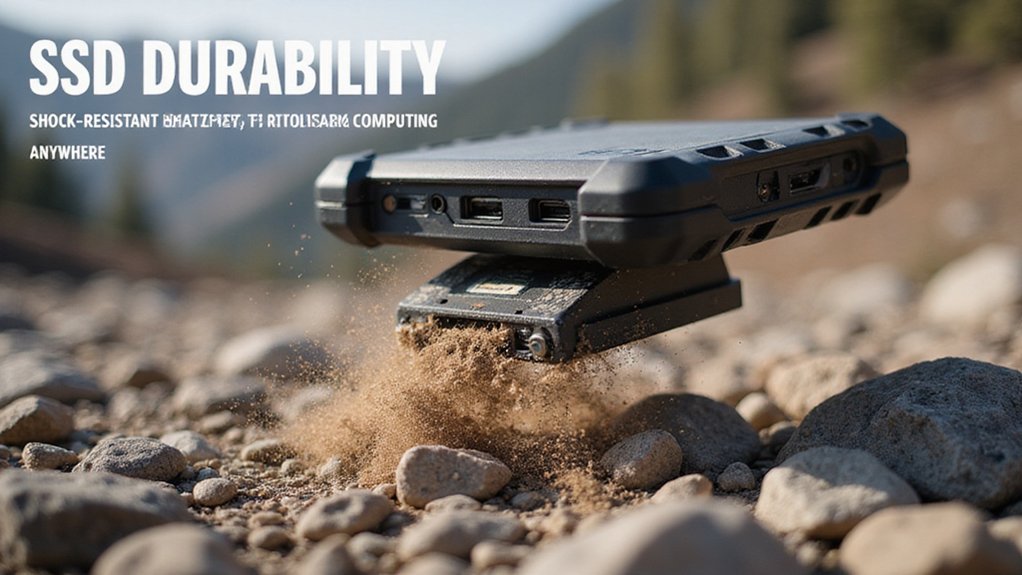
As mini PCs increasingly become the choice for professionals on the move, the shock-resistant durability of SSDs offers a critical advantage over traditional storage options.
With no moving mechanical parts, SSDs deliver superior shock tolerance against drops and jolts that would typically damage HDDs.
Your portable computing experience benefits from rugged construction features like metal casings and rubberized exteriors that absorb impacts—some models withstanding drops from up to three meters.
This physical resilience translates to consistent performance stability even when working in challenging environments.
You’ll experience fewer data integrity issues during transport or fieldwork, as these drives maintain reliable operation despite vibrations or unexpected movements.
The solid-state architecture guarantees your critical data remains protected while providing the speed and responsiveness needed for mobile productivity.
Products like the Fusion5 FMP4 Mini PC demonstrate how compact systems can leverage SSD technology to create powerful yet portable workstations.
Unlike TVs with high input lag, SSDs in mini PCs offer immediate response times essential for interactive computing tasks.
Consistent Multitasking Without Slowdowns

Modern mini PCs equipped with solid-state drives deliver exceptional multitasking capabilities without the performance degradation typically seen in HDD-based systems.
When you’re running multiple applications simultaneously, SSDs maintain consistent throughput and near-instantaneous data retrieval, eliminating bottlenecks in your workflow.
The synergy between SSDs and multi-core processors enables superior multithreaded performance, ensuring your CPU receives data without delays that would otherwise force it to idle.
This architecture particularly excels when:
- Managing virtual memory operations with minimal latency penalties
- Handling intensive I/O operations across numerous applications
- Maintaining system responsiveness even when RAM capacity is fully utilized
Unlike mechanical drives, SSDs provide stable input/output operations even under heavy workloads, sustaining performance when juggling resource-intensive tasks like video editing alongside everyday applications.
For educational settings, mini PCs with at least 512GB SSD storage offer optimal performance while maintaining a compact form factor that reduces classroom clutter.
Frequently Asked Questions
How Do I Upgrade the SSD in My Mini PC?
Check SSD compatibility first. Power down your mini PC, remove compartment screws, and extract the old drive. Insert your new SSD at the proper angle, secure it, and reinstall the cover.
Can I Use Both SSD and HDD in One Mini PC?
Yes, you can install both SSD and HDD in one mini PC if it has multiple storage interfaces. Check your motherboard’s SSD compatibility and available slots for proper storage expansion implementation.
What’s the Price Difference Between SSD and HDD Options?
Picture your storage budget stretching five times further with HDDs. You’ll pay about $0.051 per GB for SSDs versus $0.011 per GB for HDDs—roughly a 5x price differential in current storage economics.
Do Mini PCs with SSDs Require Special Cooling Solutions?
You don’t typically need special cooling solutions for mini PCs with SSDs, as they generate less heat than HDDs. However, high-performance NVMe drives may benefit from enhanced thermal management in compact spaces.
How Do SSDs Affect Gaming Performance on Mini PCs?
Like night and day, SSDs dramatically reduce gaming load times on mini PCs. While they won’t directly boost frame rates, you’ll experience smoother gameplay with fewer hitches during asset streaming.
Consider the Benefits of SSDs over HDDs in Mini PCs
You’ve explored how SSDs transform mini PCs from sluggish workhorses into thoroughbred performers. They’ll revolutionize your computing experience with unmatched speed, reliability, and efficiency while conserving precious space. By eliminating mechanical vulnerabilities, these storage solutions guarantee your data remains accessible even during transport. When you’ve integrated an SSD into your mini PC setup, you’re not just upgrading—you’re redefining what’s possible in compact computing environments.

I am a retired software engineer with experience in a multitude of areas including managing AWS and VMWare development environments. I bought a relative a mini-PC a year ago and have become passionate about the technology and its potential to change how we deploy software.
